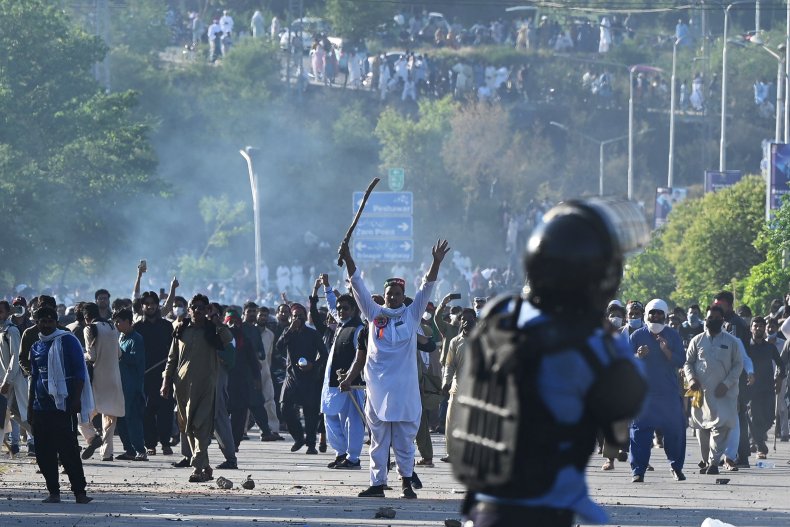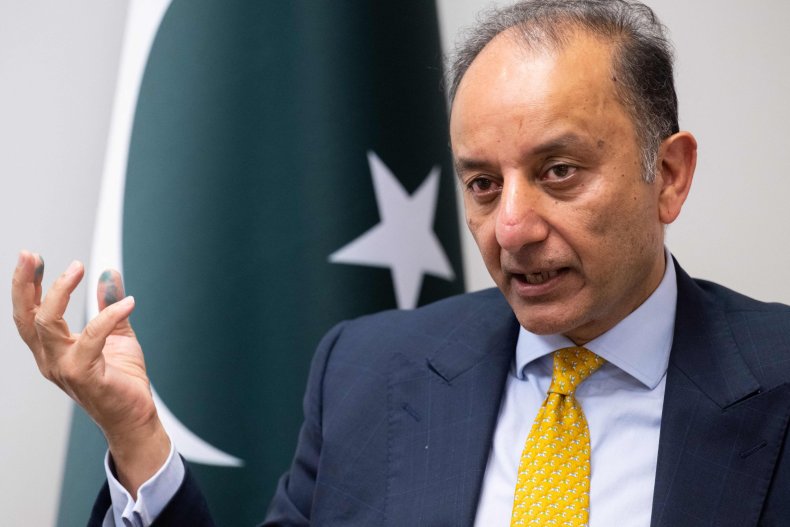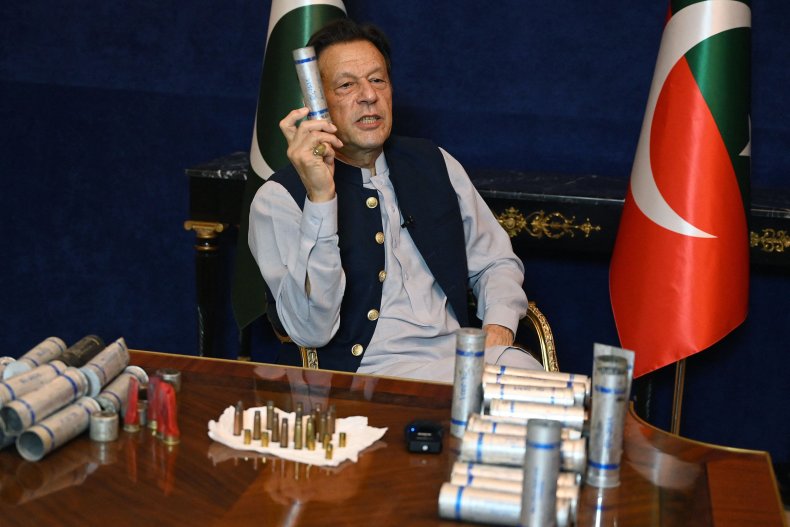TOM O'CONNOR
Speaking to Newsweek, Pakistani Petroleum Minister Musadik Malik has warned that destabilizing economic and political crises surrounding the arrest and subsequent release of former Prime Minister Imran Khan are fueling a vicious cycle of unrest in the nuclear-armed nation.
At a time when the United States is reckoning with the first-ever arrest of one of its own former presidents, Malik argued that faith in Pakistan's political system is eroding among the country's 230 million people, even as the government fights an uphill battle to restore it.
The most recent round of tumult began when Imran Khan was arrested Tuesday in Islamabad while in court for corruption charges. The former premier and Pakistan Tehreek-e-Insaf (PTI) party founder, who was ousted from office by a no-confidence vote in April of last year, has long alleged the existence of conspiracies at the highest levels of government and the military to suppress and even assassinate him, and his arrest sparked nationwide protests that at times have turned into violent clashes with security forces.
Khan was released Thursday after the Supreme Court of Pakistan ruled his arrest to be invalid, and he was put in custody at a police guest house before being released on bail Friday. These latest decisions have further polarized Pakistani politics, and Malik warned they could spark a new trend of aggressive tactics from political and insurgent forces across the country.
"So, all political parties that want to get away with corruption build up this kind of muscle to be on the streets," Malik, who is a member of current Prime Minister Shahbaz Sharif's Pakistan Muslim League (Nawaz), told Newsweek.
"And then what about the militias that surround us?" he asked rhetorically. "What when they come on the street? What if the extreme groups that you have in Pakistan, they come on the streets? Would the rest of the world tell us to do the same for the sake of stability?"What people don't see is that these poor social services and this poor economy is a consequence of a very bizarre politics, and unless the politics gets fixed, none of this is going to get fixed.
Pakistani Petroleum Minister Musadik Malik
Malik's comments were prescient. Hours after the interview, newly formed Islamist militant group Tehreek-e Jihad claimed to have killed 40 Pakistani soldiers in an attack on a military camp in the southwestern province of Balochistan. But Malik argues that the current woes reflect an even deeper-rooted trend of mishandled governance that has left more than a third of Pakistan in poverty.
"You start to question not just the political system, but the entire governance system, the institutional frameworks," he said. "And you say, 'Well, why am I not having a decent living? Why are my kids not having a reasonable opportunity at life? Why can't we have a school system which creates a level playing field and at least opens up opportunities?'"
Against this backdrop, Malik said people "begin to lose faith and they begin to lose hope, and that is basically what then feeds into the turmoil." Such turmoil, he argued, then "becomes triggers for that disenfranchised group of people, which comprises the majority of Pakistan, and that then basically creates this momentum for what I call instability."
 Pakistan Tehreek-e-Insaf (PTI) party activists and supporters of former Prime Minister Imran Khan clash with police outside the police headquarters where Khan was kept in custody until his release by Supreme Court order the following day, in Islamabad on May 10. More than 1,000 people have been arrested and at least eight killed in the unrest.
Pakistan Tehreek-e-Insaf (PTI) party activists and supporters of former Prime Minister Imran Khan clash with police outside the police headquarters where Khan was kept in custody until his release by Supreme Court order the following day, in Islamabad on May 10. More than 1,000 people have been arrested and at least eight killed in the unrest.Malik addressed the relationship between the economic and political setbacks Pakistan has faced since gaining independence from the United Kingdom in a violent partition with India in 1947.
While he argued such "triggers" as Khan's arrest and the reaction of his millions of supporters "come and go" over time, the underlying problems lie in "the political economy of Pakistan, which, frankly, is the consequence of our politics and not the other way around."
"No good economy in Pakistan is going to lead to good politics," Malik said. "But good politics in Pakistan is going to lead to good institutional frameworks, and those good institutional frameworks are going to ultimately lead to a good economy."
"We've continuously tried to [say], 'Well, let's first fix the economy, let's first fix the social fabric of Pakistan, the social services of Pakistan,'" he explained. "What people don't see is that these poor social services and this poor economy is a consequence of a very bizarre politics, and unless the politics gets fixed, none of this is going to get fixed. This I assure you."
Malik argues that no matter what kind of political system a country has, be it democratic or authoritarian, "it's the nature and quality of economy and governance that leads to social services and leads to a particular kind of economy, and we get this map wrong over and over again."And then we realized that it's not like we are a part of this global fabric. We're not even a patch, so everyone is on their own. So, you go where you go, wherever strategic degrees of freedom take you.
Pakistani Petroleum Minister Musadik Malik
But he is working to break this pattern, first by securing access to affordable energy. In an effort to reach a short-term sustainable solution, Pakistan recently proposed a fuel subsidy scheme through which wealthier segments of the population are charged more. However, the plan has been met with skepticism from the International Monetary Fund, from which Islamabad is seeking a long-delayed $1.1 billion dollar loan.
In the longer-term, Pakistan hopes to unlock new access to energy through the planned establishment of a pipeline running from Turkmenistan to India by way of Afghanistan and Pakistan. But this so-called "TAPI" pipeline has stalled since the Taliban took power in Kabul and set up a government that remains unrecognized internationally and without access to Asian Development Bank funds needed to kickstart the initiative.
The impact of geopolitical events abroad on Pakistan's embattled quest for energy options, including U.S. sanctions against Russia and Iran, has led Malik to undergo his own crisis of faith in the international order.
"I bought into this idea of one global village and one big world that we all jointly need to save," Malik said. "And then with a slight change in geopolitics, by that, I mean Russia and Ukraine, all of a sudden, I looked at the world and I said, 'Well, what about us?'"
 Pakistani Petroleum Minister Musadik Malik speaks during an interview on May 8 with AFP at the Embassy of Pakistan in Washington, D.C. Facing a deep economic crisis, Pakistan has started to buy Russian oil, but the country's petroleum minister says the future lies in diversified, especially green, energy.SAUL LOEB/AFP/GETTY IMAGES
Pakistani Petroleum Minister Musadik Malik speaks during an interview on May 8 with AFP at the Embassy of Pakistan in Washington, D.C. Facing a deep economic crisis, Pakistan has started to buy Russian oil, but the country's petroleum minister says the future lies in diversified, especially green, energy.SAUL LOEB/AFP/GETTY IMAGESWith coal returning in Europe despite Western commitments to green energy initiatives, and prices for liquefied natural gas cargo soaring from $30 million to $114 million, Malik said Pakistan made clear it would be forced "to ration gas to our industrial footprint, which is going to lead to layoffs, which is going to lead to unemployment, which is going to lead to political unrest."
"And then we realized that it's not like we are a part of this global fabric," Malik said. "We're not even a patch, so everyone is on their own. So, you go where you go, wherever strategic degrees of freedom take you."
In an effort to reduce the costs imposed this reality, Malik is leading a campaign to attract Western investment in Pakistan, including the pursuit of offshore exploration of reserves of up to 100 trillion cubic feet of natural gas.
Islamabad has sought to court foreign technology companies to promote this initiative, and the Sharif administration is also working to close a deal with Saudi Aramco to establish a refinery in Pakistan capable of refining 300,000 barrels per day. The government has announced renewable energy packages as well, which have especially drawn attention since catastrophic floods last year were linked the effects of climate change.
And while Malik said some of these initiatives have begun to gain traction within the country and among foreign partners, he acknowledged that "we are having some constraints because of this political and economic instability, and I don't see for many of these instruments, the kind and level of investments that we would like to see coming forth."
"I think there's a little bit of a lull in that because of both political instability as well as the economic constraints that we have," he added. "But, to me, these are temporary."
Substantial uncertainties exist, however, as to whether or not Khan's release from prison will alleviate or exacerbate the crisis of trust in Pakistan's political system.The judicial system should allow for people to make a run on the Capitol. That should be okay, if there are enough people doing it. Or should it be?
Pakistani Petroleum Minister Musadik Malik
Khan, a cricket star-turned-populist leader, has always maintained his innocence in the face of various charges brought against him under the Sharif administration, including those related to corruption, terrorism, rioting and blasphemy. The corruption charges at the center of the current unrest are tied to an alleged scheme in which the former premier and his wife were said to have received millions of dollars' worth of money and land as a bribe in exchange for political favors while in office.
But it was only after Khan took a swipe at the country's influential military, with whom his deteriorating ties are widely believed to have played a role in his ousting last year, that the former premier was arrested. The Islamabad High Court approved the measure, allowing for Khan to be held for eight days, only to be overruled by the Supreme Court two days later.
This chaotic series of events marks yet another severe test for democracy in a nation whose politics have been marred by decades of military coups, militant attacks, power struggles and other factors preventing each and every prime minister from completing a full term in office in the country's 75-year history.
 Former Pakistani Prime Minister Imran Khan speaks during an interview with AFP at his residence in Lahore on March 15, while displaying teargas shells allegedly fired by riot police during clashes with hundreds of his supporters gathered at his residence to prevent his arrest. Khan has alleged that authorities sought to detain him in a bid to prevent him from taking part in elections set to be held in August.AAMIR QURESHI/AFP/GETTY IMAGES
Former Pakistani Prime Minister Imran Khan speaks during an interview with AFP at his residence in Lahore on March 15, while displaying teargas shells allegedly fired by riot police during clashes with hundreds of his supporters gathered at his residence to prevent his arrest. Khan has alleged that authorities sought to detain him in a bid to prevent him from taking part in elections set to be held in August.AAMIR QURESHI/AFP/GETTY IMAGESMalik was less optimistic on the prospects of improving faith in Pakistan's public institutions in the wake of the Supreme Court ruling.
"This gives me two signals," Malik said. "Number one, my faith in justice goes down. Number two, it's giving an indication to the people of Pakistan that, if you can burn and plunder and loot and come on the streets, no law of the land applies to you."It all loops back into political economy and governance. When things like this happen, or when people are deprived of their basic humanity, of their basic rights, of decent livelihoods, of integrity, where do they look?
Pakistani Petroleum Minister Musadik Malik
Referencing his current travels throughout the U.S., Malik pointed to the frequently seen image of Lady Justice wearing a blindfold to signify that the law should be applied universally regardless of wealth, power or status. In Pakistan's case after the Supreme Court ruling, Malik said "not only should that blindfold be taken off, but there should also be a little wink there."
These questions, which have plagued Pakistan for generations, are also now being asked in the U.S. as former President Donald Trump grapples with an array of legal issues as well as lingering blowback from his supporters' storming of the Capitol in a bid to disrupt legislative efforts to confirm President Joe Biden's electoral victory in January 2021.
"The judicial system should allow for people to make a run on the Capitol," Malik said. "That should be okay, if there are enough people doing it. Or should it be?"
For now, he warns, the vicious cycle continues in Pakistan.
"It all loops back into political economy and governance," Malik said. "When things like this happen, or when people are deprived of their basic humanity, of their basic rights, of decent livelihoods, of integrity, where do they look?"
"They look at the political system, they look at the various organs of state, they look at judiciary for adjudication, where should they look?" he added. "And I think this decision is very tragic."
No comments:
Post a Comment